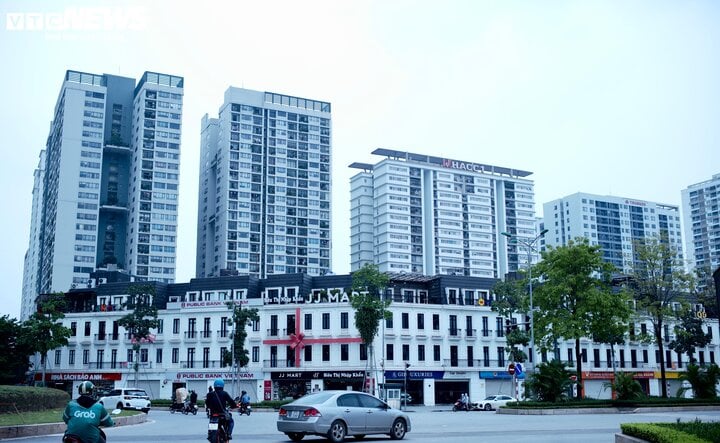The Ho Chi Minh City Real Estate Association (HoREA) has just issued a document regarding the State Bank of Vietnam (SBV) affirming that it does not restrict the rights of organizations and individuals to buy future housing in Circular No. 22/2023/TT-NHNN (amending and supplementing a number of articles of Circular No. 41/2016/TT-NHNN).
Still many misunderstandings
Accordingly, HoREA believes that although it has initially helped future home buyers feel more secure, the “legal problems” of Circular 22 still remain.
Specifically: Point a, Clause 11, Article 2 of Circular 41/2016/TT-NHNN (amended and supplemented in Clause 1, Article 1 of Circular 22/2023/TT-NHNN) only provides regulations applicable to cases of commercial housing "completed for handover", i.e. "available" commercial housing, but does not include cases of credit loans to purchase commercial housing "not completed for handover", i.e. "future-formed" commercial housing.
According to HoREA, the concept of “completed house for handover” cannot be interpreted to include “future housing” to be accepted by commercial banks as collateral for loans to buy that very house.
Furthermore, the announcement of the State Bank confirmed that "Circular 41/2016/TT-NHNN regulating the capital safety ratio of commercial banks and foreign bank branches is not a document guiding credit granting operations of credit institutions".
But in fact, Circular 41 (amended and supplemented in Clause 1, Article 1 of Circular 22/2023/TT-NHNN) contains legal regulations not related to "regulations on capital safety ratio of commercial banks and foreign bank branches", but related to "credit granting operations of credit institutions".
Specifically, Clause 11, Article 2 stipulates "loans secured by real estate for individuals to buy houses that meet the conditions", similar to the provisions in the circulars of the State Bank "guiding credit granting operations of credit institutions".
" The Association finds that if Circular 41 only regulates "the capital safety ratio of commercial banks and foreign bank branches", it is not necessary to have legal regulations regulating the "conditions" of "a home mortgage loan is a loan secured by real estate for individuals to buy a house" in Clause 11, Article 2 because there are already circulars of the State Bank guiding the credit granting operations of credit institutions ", HoREA's document raised the issue.
In addition, according to HoREA, the document "Some information related to regulations on capital safety ratio for banks and foreign bank branches" recently issued by the State Bank of Vietnam is not a "legal document" like circulars, so it is only valuable for providing information.
Meanwhile, banks and foreign bank branches must base on the Law on Credit Institutions and Circulars of the State Bank to perform credit granting operations.

Mortgages secured by future real estate are facing difficulties. (Illustration: Cong Hieu)
Circulars must be clearly amended and supplemented.
In response to the above difficulties, HoREA believes that before Circular No. 22/2023/TT-NHNN takes effect from July 1, 2024, it needs to be amended and supplemented soon to support the real estate market in the process of recovery and transparent, safe, healthy and sustainable development. At the same time, it will create conditions for credit institutions to review and approve credit loans for individuals to buy "future-formed commercial housing" secured (mortgaged) by that house.
Many other experts also agree that the State Bank needs to amend the circular to make it legally clear and transparent instead of just announcing information and responding to public opinions.
Dr. Le Dang Doanh, former Director of the Central Institute for Economic Management, said that borrowing and lending must comply with the credit law and the State Bank should have clear written instructions. Before the circular is issued, such instructions should be provided so that relevant parties can participate in giving their opinions to avoid misunderstandings and unnecessary debates.
Associate Professor, Dr. Dinh Trong Thinh stated that it is necessary to not ban loans for future housing purchases. However, the State Bank has not issued any legal documents on this issue, requiring commercial banks to improve their appraisal capacity and self-appraise to make decisions.

Experts recommend clarifying the circular on borrowing money to buy future houses. (Illustration photo)
Another economic expert analyzed: “ Credit institutions often comply with decrees and circulars issued by the State Bank with clear legal value. If Circular 22 does not clarify the concepts, it will cause businesses and people to misunderstand, panic, and doubt, and credit institutions will be confused, even reluctant to lend.
If the State Bank has not banned lending for home purchases in the future, it should take action to legalize this to remove difficulties for all parties after the circular comes into effect .
Representatives of many real estate businesses also expressed confusion about the new regulations. The leader of a business in Hanoi said: "If the State Bank does not clearly regulate, we will have no legal basis to transact with banks. In the current context of difficulty in accessing credit capital, amending and clarifying the circular to protect businesses is very necessary."
In a recent document, the State Bank affirmed that the new regulation does not restrict the rights of future home buyers and is not contrary to current regulations.
"The completed home condition under the home purchase contract only applies to home mortgage loans (which are subject to a lower risk factor than other real estate-secured loans).
In case an organization or individual has a need to build or buy a future house and mortgages the future house, it will be a case of a loan secured by real estate as prescribed in Clause 10, Article 2 of Circular 41 and the corresponding risk coefficient as prescribed in Clause 10, Article 9 of Circular 41 will be applied.
Specifically, organizations and individuals who need to buy a house and secure (mortgage) this future house will apply a risk coefficient of 30-120% depending on the guarantee ratio (LTV) calculated by the ratio of the loan balance to the value of the collateral. In case there is no information about the LTV ratio, the risk coefficient is 150%.
Cong Hieu
Source





![[Photo] Visiting Cu Chi Tunnels - a heroic underground feat](https://vstatic.vietnam.vn/vietnam/resource/IMAGE/2025/4/8/06cb489403514b878768dd7262daba0b)





















































































Comment (0)